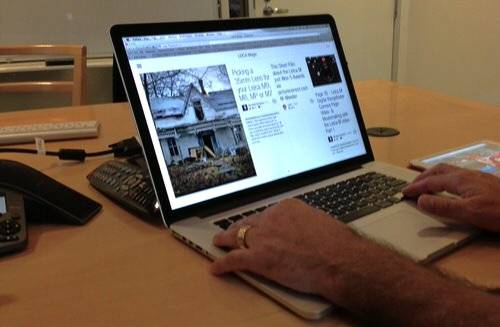Flipboard, a pioneer of tablet apps, has launched a full Web version of its news reader.
In a break from its signature “flip” metaphor, Flipboard for Web embraces scrolling, the natural gesture people use to read on the Web. And it’s hoping that lush, photo-heavy layouts will encourage people to keep reading.
Flipboard CEO Mike McCue unveiled the new product at a launch event in Flipboard’s original office in downtown Palo Alto Tuesday morning.
In 2010, McCue and his team considered launching a Web-based news reader, but decided to embrace Apple’s then-rumored iPad tablet instead. When the iPad launched, Flipboard became a standard-bearer for Apple’s new mobile platform.
“It was pretty clear to us that it wasn’t ready to happen in the Web browsers of that time,” McCue told me. The iPad allowed Flipboard’s designers to reimagine the Web, stripped of gaudy banner ads, awkward side rails, and other cruft it accumulated over the past two decades.

A lot has happened since 2010, though. The Web has quietly become vastly more capable. And it’s no secret that tablet sales—particularly iPad sales—have stalled. And Flipboard has seen its strongest growth since launching mobile apps for smartphones.
Over the past two years, we’ve seen Flipboard tiptoe back onto the Web, first with tools for people who created “magazines”—editorial selections of links—on the app, and later with full Web versions of those magazines. But Flipboard as a news-reading experience remained app-only until now.
That hasn’t held back its growth: Flipboard has grown from about 35 million active monthly readers in October, when it launched a third major version of its app, to 50 million today, McCue said.
One consideration for Flipboard in launching a full Web version, McCue said, was interest by the publishers it’s working with, who still “do a considerable portion of their business on the Web.” Flipboard is increasingly working to place and sell ads in Flipboard magazines, including major print publishers like Condé Nast and Time Inc. as well as smaller publishers and individual magazine creators.
In August, McCue revealed at our ReadWriteMix event that Flipboard had started cutting checks to smaller publishers. Here’s the full video of that interview:
Screenshot via Marcos Weskamp’s Flipboard

















